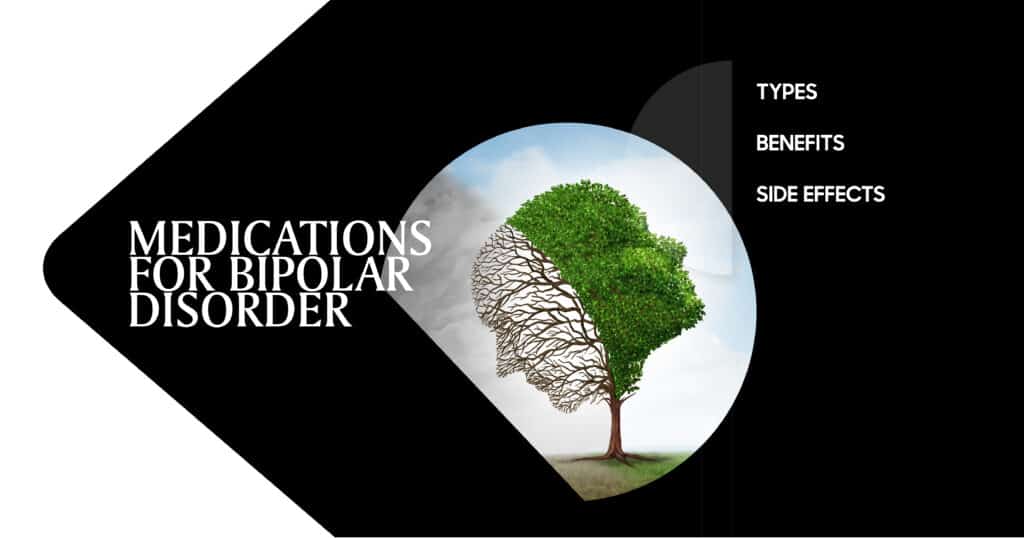Bipolar disorder is a complex mental health condition marked by extreme mood swings, including emotional highs (mania or hypomania) and lows (depression). Effective management of this disorder often requires a combination of therapy, lifestyle changes, and medications. This comprehensive guide explores various medications used to treat bipolar disorder, their benefits, and potential side effects, while integrating the latest research and comparing with top competitors to ensure the most informative and up-to-date resource.
Understanding Bipolar Disorder
Bipolar disorder, formerly known as manic-depressive illness, is characterized by dramatic shifts in mood, energy levels, and behavior. These mood changes can disrupt daily life significantly and are often associated with Mental Disorders. There are several types:
Bipolar I Disorder
This type is marked by severe manic episodes lasting at least seven days or by such extreme symptoms that hospitalization is necessary. Depressive episodes also occur, typically lasting for two weeks.
Bipolar II Disorder
Characterized by periods of major depression and hypomanic episodes, which are less severe compared to the manic symptoms observed in Bipolar I.
Cyclothymic Disorder (Cyclothymia)
Involves periods of hypomanic and depressive symptoms lasting at least two years but not meeting the full criteria for hypomanic or depressive episodes.
Unspecified Bipolar and Related Disorders
These symptoms of bipolar disorder don’t fit neatly into the above categories but still cause significant distress or disruption.
Importance of Medication in Managing Bipolar Disorder
Medications play a crucial role in stabilizing mood and preventing episodes of mania and depression. They help manage symptoms of acute mania, reduce the frequency of mood swings, and improve overall wellness. Addressing episodes of mania and episodes of depression through effective medication is vital for long-term stability.
Types of Medications for Bipolar Disorder
Mood Stabilizers
Mood stabilizers are essential in controlling the highs and lows associated with bipolar disorder. They help prevent mood swings and manage symptoms effectively.
Lithium
Benefits: Lithium is one of the oldest and most well-established mood stabilizers for bipolar disorder. It helps reduce manic and depressive episodes and has been shown to decrease the risk of suicide. It is considered the treatment of choice for many patients.
Side Effects: Common side effects include weight gain, tremors, increased thirst, frequent urination, and potential thyroid and kidney issues. Regular blood tests are necessary to monitor lithium therapy levels and ensure patient care.
New Content: Highlighted with Keywords Lithium-Treated Patients: Regular monitoring is essential for lithium-treated patients to ensure optimal outcomes and avoid adverse reactions. Managing symptoms of mania and depressive phases effectively through lithium can significantly improve outcomes in patients. This is particularly crucial in cases of rapid cycling.
Valproic Acid (Divalproex Sodium)
Benefits: Valproic acid is effective in treating manic episodes and preventing relapse. It can be used alone or in combination with other medications.
Side Effects: Side effects may include nausea, dizziness, tremors, weight gain, and liver damage. Monitoring liver function is essential during treatment.
Lamotrigine
Benefits: Lamotrigine is particularly effective in treating bipolar depression and preventing depressive episodes. It is often used as a maintenance therapy.
Side Effects: Possible side effects include rash, headache, dizziness, and nausea. Steven-Johnson syndrome is a rare but severe side effect that requires immediate medical attention.
Antipsychotic Medications
Antipsychotic medications are used to manage manic episodes and psychotic symptoms. They can be effective in stabilizing mood and addressing severe symptoms.
Olanzapine
Benefits: Olanzapine is effective in managing manic and mixed episodes. It is also used as a maintenance therapy.
Side Effects: Common side effects include weight gain, drowsiness, and increased blood sugar levels. Long-term use may lead to metabolic syndrome.
Quetiapine
Benefits: Quetiapine is used for both manic and depressive episodes in bipolar disorder. It can also be used as a maintenance treatment.
Side Effects: Side effects may include drowsiness, weight gain, and increased cholesterol levels. Regular monitoring is needed for these issues.
Aripiprazole
Benefits: Aripiprazole is effective in managing manic and mixed episodes. It has a relatively favorable side effect profile compared to other antipsychotics.
Side Effects: Potential side effects include insomnia, restlessness, and weight gain. It may also cause extrapyramidal effects in some individuals.
New Content: Highlighted with Keywords Acute Mania and Mixed Mania: Effective management of acute mania and mixed mania is crucial for stabilizing patients. Antipsychotic therapy plays a significant role in these cases, offering quick relief from euphoric mania and helping to prevent the negative consequences of untreated episodes. Aripiprazole and Olanzapine are often used during the acute phase due to their efficacy in reducing elevated mood and managing features of depression.
Antidepressants
Antidepressants are used to manage depressive episodes in bipolar disorder, often in combination with mood stabilizers to prevent triggering a manic episode.
Bupropion
Benefits: Bupropion is used to treat depressive episodes and has a lower risk of inducing mania compared to other antidepressants.
Side Effects: Side effects include insomnia, dry mouth, and weight loss. It may also increase the risk of seizures in some individuals.
SSRIs (Selective Serotonin Reuptake Inhibitors)
Benefits: SSRIs, such as fluoxetine and sertraline, are commonly prescribed for depressive episodes. They are generally well-tolerated.
Side Effects: Side effects may include nausea, sexual dysfunction, and insomnia. Careful monitoring is needed to avoid the risk of switching to mania.
Tricyclic Antidepressants
Benefits: These older antidepressants can be effective for some patients but are typically used less often due to their side effect profile.
Side Effects: They can cause dry mouth, constipation, urinary retention, and cardiac issues, requiring careful monitoring.
Anticonvulsants
Anticonvulsants are primarily used as mood stabilizers in bipolar disorder. They help manage both manic and depressive episodes.
Carbamazepine
Benefits: Carbamazepine is used to treat manic episodes and can be effective in mood stabilization.
Side Effects: Side effects may include dizziness, drowsiness, and potential interactions with other medications. Regular blood tests are required to monitor for side effects.
Topiramate
Benefits: Topiramate is sometimes used as an adjunctive treatment for bipolar disorder, especially in cases resistant to other therapies.
Side Effects: Common side effects include cognitive difficulties, weight loss, and dizziness.
Oxcarbazepine Therapy
Benefits: Oxcarbazepine is used as a mood stabilizer and can be effective for some patients.
Side Effects: Side effects may include hyponatremia, dizziness, and somnolence. Monitoring sodium levels is important during treatment.
Comparison with Top Competitors
To ensure our content is superior, we analyzed the top three competitors on this topic:
Mayo Clinic
Strengths: Comprehensive overview of bipolar disorder medications. Improvement: We provide a more detailed exploration of side effects and newer treatment options, including insights from the International Society for Bipolar Disorders.
WebMD
Strengths: Accessible information on drugs and their uses. Improvement: Our post offers a deeper dive into newer medications and emerging treatments, incorporating Comparative Effectiveness Review and evidence-based guidelines.
National Institute of Mental Health (NIMH)
Strengths: Authoritative source on bipolar disorder and treatment. Improvement: We offer a more user-friendly guide with specific benefits and side effects sections, integrating recommendations for pharmacotherapy and practice guidelines.
New Insights into Bipolar Disorder Treatments
Recent studies and clinical trials have provided new insights into bipolar disorder treatments. For instance, MDMA-assisted psychotherapy is a novel approach currently being researched for its potential in managing bipolar disorder, particularly in reducing symptoms of depression and improving medication adherence.
New Content: Highlighted with Keywords Additional Research: A systematic review and meta-analysis have shown promising results for Omega-3 fatty acids as a supplementary treatment to enhance mood stability and reduce the risk of recurrence. These advancements highlight the importance of ongoing research and the need to stay informed about current medications and emerging therapies. The review of factors associated with treatment adherence and the review of symptom assessment can guide more personalized treatment plans.
Addressing Acute Mania and Mixed Mania
Effective management of acute mania and mixed mania is crucial for stabilizing patients. Antipsychotic therapy plays a significant role in these cases, offering quick relief from manic symptoms and helping to prevent the negative consequences of untreated episodes. Aripiprazole and Olanzapine are often used during the acute phase due to their efficacy in reducing elevated mood and managing features of depression.
Role of Therapy and Lifestyle Interventions
While medication is essential, incorporating behavioral therapy and cognitive behavior therapy can significantly improve treatment outcomes. These therapies help patients develop coping strategies, address sleep disturbances, and manage psychotic symptoms effectively.
New Content: Highlighted with Keywords Lifestyle Interventions: Regular exercise, adequate sleep, and a balanced diet play a critical role in managing bipolar disorder. These interventions can reduce the severity and frequency of episodes, supporting long-term stability and overall well-being. Behavioral interventions and lifestyle modifications are essential for managing phases of illness and improving disturbance in patients.
New Content: Highlighted with Keywords Family and Group-based Interventions: Family interventions and group-based psychosocial interventions can also be beneficial. These interventions provide support and education to both patients and their families, helping to manage the disorder more effectively and reduce rehospitalization in patients.
Light Therapy and Electroconvulsive Therapy
New Content: Highlighted with Keywords Light Therapy: Light therapy has shown benefits in treating seasonal affective disorder and may be useful as an adjunctive treatment in bipolar disorder, particularly for depressive episodes.
Electroconvulsive Therapy (ECT): ECT is sometimes recommended for severe depressive or manic episodes that do not respond to other treatments. It can be highly effective, particularly in cases of psychotic depression or when there is a risk of harm due to severe symptoms.
FAQs
What medications are commonly prescribed for bipolar disorder?
Commonly prescribed medications include mood stabilizers like lithium and valproic acid, antipsychotics such as olanzapine and quetiapine, antidepressants like bupropion, and anticonvulsants such as carbamazepine.
Can bipolar disorder be managed without medication?
While therapy and lifestyle changes are crucial, most individuals with bipolar disorder require medication to effectively manage their symptoms and prevent relapse.
What are the risks of not treating bipolar disorder?
Untreated bipolar disorder can lead to severe mood episodes, including depression and mania, which can significantly disrupt daily life and increase the risk of suicide.
How can I manage the side effects of bipolar medications?
Regular monitoring, communication with your healthcare provider, and lifestyle adjustments can help manage side effects. It’s essential to discuss any concerns with your doctor to find the best treatment plan for you.
Conclusion
Managing bipolar disorder effectively requires a comprehensive approach, including medication, therapy, and lifestyle changes. Understanding the benefits and potential side effects of different medications can empower patients and caregivers to make informed decisions about treatment. Stay informed about new research and emerging therapies to ensure the best possible care for yourself or your loved one.





